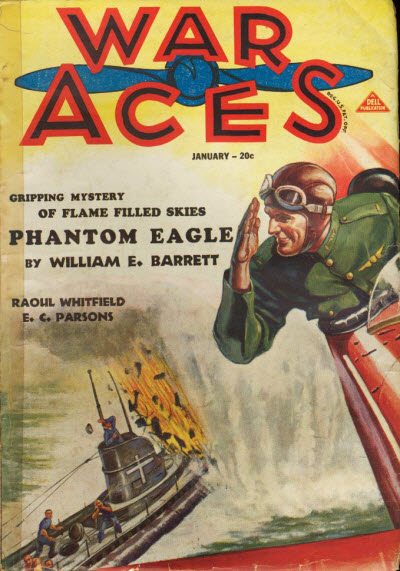“Phantom Eagle” by William E. Barrett
THIS November we’re celebrating William E. Barrett’s Birthday with one of his pulp stories each Friday.
Before he became renown for such classics as The Left Hand of God and Lilies of The Field, Barrett honed his craft across the pages of the pulp magazines—and nowhere more so than in War Birds and it’s companion magazine War Aces where he contributed smashing novels and novelettes, True tales of the Aces of the Great War, encyclopedic articles on the great war planes as well as other factual features. Here at Age of Aces Books he’s best known for his nine Iron Ace stories which ran in Sky Birds in the mid ’30s!
From the Tarmac letters column  in the January 1932 War Aces—”Unless we misjudge the reading taste of our readers we feel that “Phantom Eagle,†by W. E. Barrett is about the ideal story. It has that balance of action, mystery and fantasy that gives you a new set of thrills. Obviously, it was too bizarre to be entirely fiction, so we asked the author about it. As is the case with most of Barrett’s fiction, it is based on some true incident. Here is his letter:
in the January 1932 War Aces—”Unless we misjudge the reading taste of our readers we feel that “Phantom Eagle,†by W. E. Barrett is about the ideal story. It has that balance of action, mystery and fantasy that gives you a new set of thrills. Obviously, it was too bizarre to be entirely fiction, so we asked the author about it. As is the case with most of Barrett’s fiction, it is based on some true incident. Here is his letter:
You’ve guessed it. There was a great deal of truth behind that yarn. We were up at Ayr, Scotland, getting the finishing touches on acrobatics. In my flight there was a young English lad of the aristocratic type so commonly turned out by Oxford. He was about the best on the field when he felt like it or thought he had an appreciative gallery watching him. He didn’t have a great deal of stomach, though.
He wiped his landing gear off one day making a stall landing and it was a week before he got over the resultant ground loops. Most of the chaps passed him by—the white feather was a bit obvious. We were all in a little pub one night imbibing a bit when our hero got into a brawl with a sour old Scotsman. He was getting the worst of it and was looking for a way to quit when the son of the heather knocked him cold.
A big, burly, slow-moving chap got up out of the corner and came over. He faced the Scotsman and methodically assumed a fighting pose.
“What a Lauterman starts, a Lauterman finishes.†Those were the only words he uttered, but he gave the Scotsman an unmerciful beating. By inquiring around a bit I found the history of those brothers who were so utterly dissimilar. I learned the history of that German father and English mother—the proud loyalty to anything that a Lauterman did held by that elder brother.
We went out to France and young Lauterman went with us. He didn’t hold up on the line in combat work and was transferred to a bombing outfit. He turned up missing in action one day and we never heard from him after that.
The rest of the story is pure fiction. I simply pictured what would happen if those two brothers met on the lines. In the last analysis I believe the elder Lauterman would have acted just as I have him do in the story.
— W.E. Barrett.
Hell’s hinges sealed the lips of that Unteroffizier in the pilotless Spad. None could tell how that phantom transfer had been made in shell-torn skies, or the meaning of that dying speech, “What a Lauterman starts, a Lauterman finishes”
From the January 1932 War Aces, it’s a story you won’t soon forget—William E. Barrett’s “Phantom Eagle!”
- Download “Phantom Eagle” (January 1932, War Aces)




